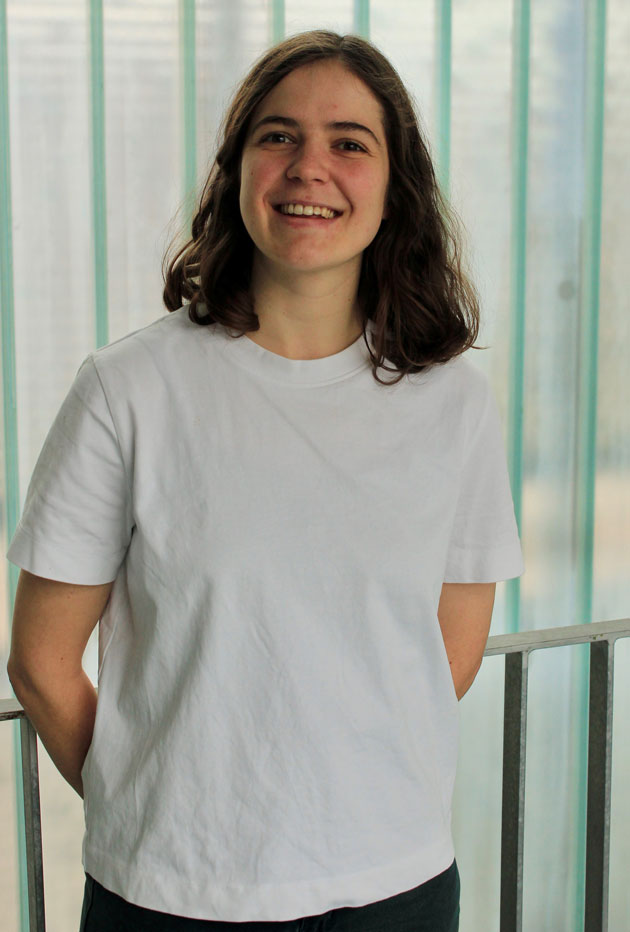
Stony Brook, via Leuven, Belgium.
Eef Gijbels, a second-year PhD student at KU Leuven’s Center for Sociological Research, traded the cobblestone streets of one of Belgium’s most picturesque cities for suburban Stony Brook University this spring.
At KU Leuven, Gijbels is conducting a four-year research project focused on poverty risks and trends among children with disabilities in Belgium and across Europe.
What motivated Gijbels to attend SBU’s School of Social Welfare as a visiting PhD student? Associate Professor Zachary A. Morris, PhD, MSW – an expert in disability and health policy, comparative social policy, and poverty.
“Dr. Morris’ work on the additional costs of living with a disability using the standard of living approach across countries closely relates to my PhD research focusing on the cost of childhood disability,” said Gijbels. “I am happy that his expertise can contribute to this collaborative research.”
Between attending seminars, enjoying NBA games, and collaborating with SSW faculty, Gijbels experienced a unique blend of American culture and academia. Learn more about her time in the States below.
SSW: Talk about your role at the Center for Sociological Research at KU Leuven. What does your work consist of?
EG: My research work focuses on poverty risks and trends among children with disabilities in Belgium and Europe alike. I study the direct and indirect costs associated with childhood disabilities. In addition to research, I’m involved in educational activities such as supervising master’s theses, mentoring students on paper assignments for specific courses in the social policy and social work master’s program, and organizing outreach events for future sociology students.
SSW: Has your work there influenced policy in Belgium at local, regional, or national levels?
EG: Yes, before starting my PhD, I worked as a research assistant on a Belgian government-commissioned project at the Center for Sociological Research. In the research project, we calculated the needs-based costs of childhood disability in Belgium and evaluated the adequacy of the financial support available to families with children with disabilities. We have written a report on this, including several policy recommendations, directed to the government.
SSW: How did your visiting PhD program work? Did you have a regular course load? Did you assist and/or collaborate with faculty on research?
EG: During my stay, I participated in the weekly seminar Social Welfare Policy Analysis: Social Work, Politics, and Health, taught by Dr. Morris, together with other PhD students at Stony Brook. I also collaborated with Dr. Morris on a research article examining the extra costs associated with childhood disabilities across European welfare states.
SSW: You delivered a talk at Stony Brook on April 22 about your research titled Direct costs of childhood disability across European countries: Application of a standard of living approach. What prompted you to pursue this line of research?
EG: My interest in the additional costs associated with childhood disability was developed during the policy-focused research project I mentioned earlier. I realized that there is a significant gap in both national and international research on this topic, despite its importance for shaping effective social policies. This motivated me to explore the issue further through my PhD research. My interest in this topic was also shaped earlier through experiences during internships in social work with organizations supporting children and youth with disabilities, as well as through volunteer work with persons with disabilities.
SSW: What have you learned about the social work profession in America? What have you learned about America’s welfare mechanisms, and how has it changed your worldview from a professional perspective?
EG: My time at Stony Brook has broadened my perspective on social welfare systems. Learning about social policies related to poverty, health and social protection, and disability-specific policies in the U.S., but also globally, has complemented my knowledge of European welfare states.
SSW: How have you enjoyed your time at the Stony Brook School of Social Welfare? Have you ever studied abroad or attended an institution outside of Belgium before?
EG: This was my first experience studying at an institution outside of Belgium, and it has been really rewarding. I’ve learned a lot, and I’m grateful for the opportunity to engage with everyone at Stony Brook.
SSW: Talk about your experience living in America. What has been the most memorable thing you’ve done since you arrived?
EG: I stayed in Brooklyn during my visit and enjoyed my time there. I was especially impressed by the friendliness and openness of the people I met. Attending Knicks and baseball games were the most memorable things for me.
